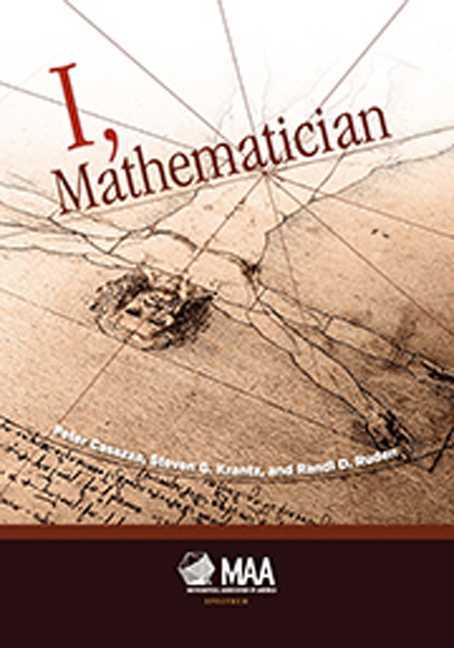Book contents
- Frontmatter
- Contents
- Preface
- Part 1 Who Are Mathematicians?
- Part II On Becoming a Mathematician
- Part III Why I Became a Mathematician
- Foreword to Why I Became a Mathematician
- 20 Why I Became a Mathematician: A Personal Account
- 21 Why I Became a Mathematician?
- 22 Why I am a Mathematician
- 23 Why I am a Mathematician
- 24 Why I am a mathematician
Foreword to Why I Became a Mathematician
from Part III - Why I Became a Mathematician
- Frontmatter
- Contents
- Preface
- Part 1 Who Are Mathematicians?
- Part II On Becoming a Mathematician
- Part III Why I Became a Mathematician
- Foreword to Why I Became a Mathematician
- 20 Why I Became a Mathematician: A Personal Account
- 21 Why I Became a Mathematician?
- 22 Why I am a Mathematician
- 23 Why I am a Mathematician
- 24 Why I am a mathematician
Summary
Many of us who are mathematicians do not spend a lot of time fussing over why we became mathematicians. It was something that we evolved into, and it happened naturally.
But an invitation to write for this portion of our book gave several activemathematicians an opportunity to really dwell on this question. And the results are informative and inspiring.
Some people became mathematicians because they love to solve problems, others because they love to teach or communicate, others because they love to develop theories, still others because they love logic. In many, if not most, instances there was a key teacher or mentor who set an example and inspired the individual in question to pursue the mathematical life.
And this is an observation not to be downplayed. It would be virtually impossible for a person in complete isolation to develop into a mathematician. There must be some teaching or mentoring or instruction involved. Even the great Ramanujan noted a particular text that he found inspiring.
It is always instructive to pause and endeavor to determine how and why we became who we became. Such rumination helps us to develop a sense of ourselves, and also a sense of what mathematics is, what it means to us, and how it has played a role in our lives. It is unlikely that a carpenter would engage in similar cogitations. There is something special about mathematics that inspires us, and gives our lives meaning. One of the main purposes of this book is explicate this point, and to make it understandable to non-mathematicians.
Perhaps reading these words will attract some new people to consider taking up mathematics. That would be a happy outcome for all concerned.
- Type
- Chapter
- Information
- I, Mathematician , pp. 253 - 254Publisher: Mathematical Association of AmericaPrint publication year: 2015

